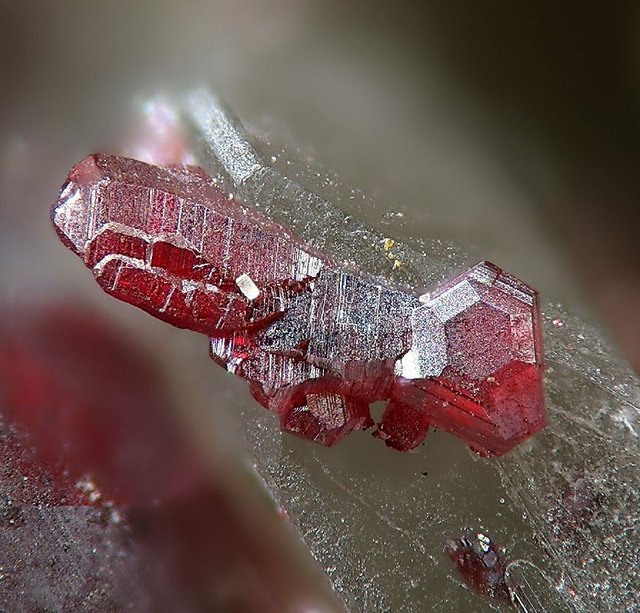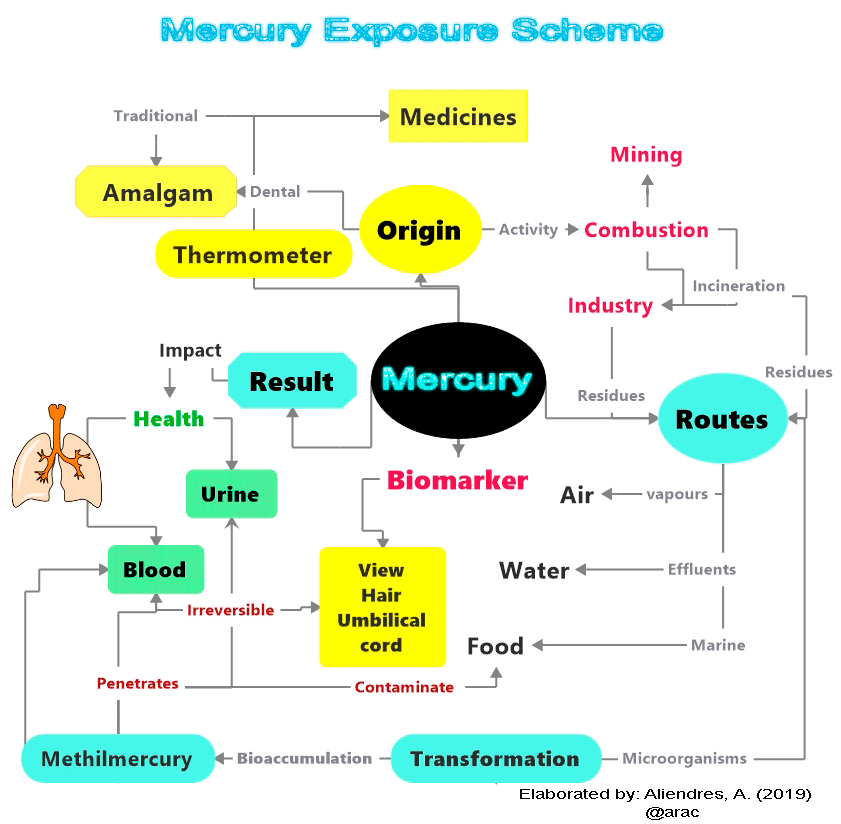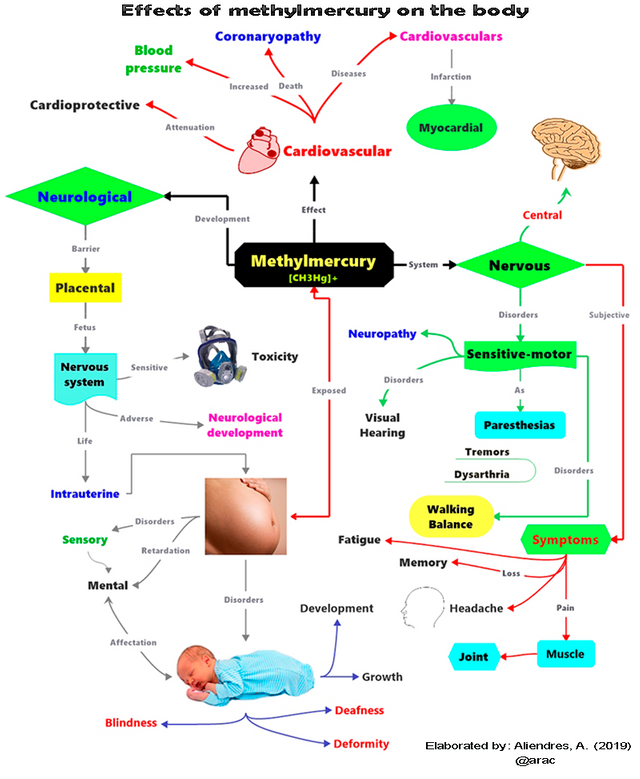Impact of mercury on health
Aliendres, A.
11/10/2019
Dear scientific community and followers of stem content.
I share the present post entitled impact of mercury on health, product of a moderate documentary review. Research framework that led me to form theoretical and methodological conceptual constructs, general conclusions that I describe below.

[
Introduction
Marine and aquatic products are characterised by their high protein value, richness in vitamins (A, D and E) and minerals; they enjoy digestible enzymatic properties, are low in saturated fats and rich in Omega 3 fats. The generally marine species contain two of these main fatty acids of the Omega 3 chain: Docosahexaenoic acid (DHA) and the eicosapentaenoic acid (EPA) that the organism scarcely produces; in so much, they are obtained through foods that contain it because they provide calories that our organism takes advantage of turning them into energy, they help to maintain good cardiovascular functioning, pulmonary, endocrine system, blood spleens and even the concentrations of DHA are essential for a healthy vision, vital for the brain and regulate the production of spermatozoids, among other biophysiological benefits.
Fatty acids in marine products
| Common name | Scientific name | Omega-3g / 3-0z |
|---|---|---|
| Yellowfin tuna | Thunnus albacares | 0.26-0.73 |
| Pollack | Pollachius pollachius | 0.46 |
| Salmon | Salmo salar | 0.68-1.83 |
| Cod | Gadus morhua | 0.13-0.24 |
| Catfish | Siluriformes | 0.15-0.20 |
| Sole | Paralichthys adspersus | 0.43 |
| Grouper | Epinephelinae | 0.21 |
| Gold | Coryphaena hippurus | 0.12 |
| Herring | Clupea | 0.71-1.81 |
| Crabs | Austropotamobius pallipes | 0.34-0.40 |
| Scallops | Pectinidae | 0.17 |
| Oyster | Ostrea edulis | 0.37-1.17 |
| Shrimp | Caridea | 0.27 |
| Clam | Venus antiqua | 0.24 |
Worth a complete article is the protein-rich diet of the Eskimos (native communities that inhabit the Arctic region of North America and part of Siberia) composed mainly of fat-soluble fats contained in the protein meat of whales and seals, also, the consumption of fish provides them with significant vitamins and fatty acids. Up to this line everything has been beneficial for the health and prolongation of human life.
Mercury and health
Mercury, whose chemical symbol is Hg, is a beautiful silver metal that distinguishes from other elements of the periodic table by its liquid state at room temperature, less pleasant properties characterized by its lethal toxicity and fragile volatility by issuing an insidious cocktail of colorless and odorless vapor.
Biohistory of mercury in healths
The neurotoxic effects of mercury have been occurring for many years, at the end of the nineteenth century, the use of mercury nitrate to synthesize felt from the hairs of hare, rabbits, beaver and other species used for the manufacture of hats, gave rise to the jokingly crazy phrase as a hatter (as a hat maker). Not amusingly, if there was an irrational behavior and distortion of reality in those who for years had been working as hatters, the vapors of mercuric nitrate to be inhaled and enter the body had produced severe neurological and behavioral disorders in people exposed to these environmental conditions. So the European fashion of pointy hats has its human cost.
In the mid-twentieth century, specifically in 1956, in Minamata Bay in Japan, two girls in the prime of life were diagnosed with severe levels of poisoning and irreversible damage from mercury. Later, the cover blanket was lifted and the public health emergency was declared because it was a population poisoning caused by a chemical plant that discharged industrial effluents into the river, contaminating the aquatic biota, the main source of livelihood for the villagers. Years later, the world community recognizes and commemorates the victims with the Minamata Convention which is a global instrument with the rank of a treaty to prevent regrettable events such as Minamata, there is a commitment to protect human health and the environment from possible emissions and harmful effects of mercury.
Sources and routes of mercury exposure
Mercury is naturally present in the biosphere in air, water and the earth's crust, as it occurs through phenomena such as volcanic eruptions, burning of fossil fuels (plant biomass), steam from fumaroles, processes of large bodies of water and biological processes. In its cyclic dynamics, when mercury enters water masses, it begins its journey as a host of aquatic microorganisms that through a complex biological and chemical process transform it into methylmercury. In the following diagram you can see which is the route of mercury in the environment to become methylmercury and cause severe damage to human health.

(OMS, Environmental Burden of Disease Series, n.º 16)
Generally, human activities are the main generators of mercury sources that contribute considerably with high concentrations of this element to the environment with artisanal and illegal mining, diverse industrial activities, use of fossil fuels, cement industry, burning of garbage in open-pit dumps where there is no classification of chemical wastes and hazardous materials. The worst thing is that this terrible element travels without a passport all over the world in the air, land and water, drastically affecting regions and nations that do not generate or produce this pollutant.
Organic mercury (methylmercury)
For the reasons I have explained, mercury is transported in the environment reaching the bodies of marine waters, lakes and surface waters to be transformed by bacteria that are responsible for bioaccumulating it in the biota (plankton, algae, fish and other species ...); the truth is that through the trophic chain and the predator order the first links of the chain introduce methylmercury in their organism and the carnivores of greater size and age are concentrating great quantities of this substance when ingesting fish of smaller size. Because of this, the consumption of species such as: giant mackerel, chestnut snapper, swordfish, tilefish, tuna and shark should be avoided. Studies to determine mercury levels in large fish are diverse and recognized.
Researchers Jason O'Bryhim and Stacey Lance, (...) took 170 samples of shark and ray muscle tissue for sale at markets in San Jose (...) and Heredia (5 fisheries) (...) in September 2014. They analyzed the total amount of mercury in each sample using procedures approved by the U.S. Environmental Protection Agency (EPA).
...“the samples for 3 species tested exceeded US health guidelines (...) Silky sharks are of special concern as they constitute 70% of all sharks sold to the public, and some of the samples tested far exceeded the US health threshold.”... Source
The diagram below illustrates the route of methylmercury in the body and the effects it causes and even during intrauterine life.

(OMS, Environmental Burden of Disease Series, n.º 16)
However, as the protein of fish and other marine products is one of the main sources of food for people, organic mercury enters the body causing severe damage to health as described in the diagram above. The complicated thing is that mercury is a heavy metal, once it has entered the organism it cannot be expelled with any treatment, that is why we speak of irreversible damage.
Conclusions
- It is proven that anthropogenic activities have accelerated the problem of mercury in the environment and therefore has a negative impact on the marine, lake and continental biota that is the main source of food for humans.
- Apart from food, cosmetic products such as bleaching creams, fluorescent tubes and synthetic substances need to be evaluated to determine mercury levels and definitively withdrawn from the market.
- There is a gap in information regarding public health problems in society caused by the consumption of foods high in methylmercury.
- It is necessary to establish maternal protection programs with specialized personnel to prevent irreversible damage during and after intrauterine life.
Recommendations
- Activate a strategic decontamination plan in the main natural water bodies exposed to high levels of mercury toxicity due to mining, especially in the Amazon where mining is degrading the environment, putting biological diversity at risk and attacking indigenous populations, who depend on 70% of the fishing activity.
- Design and implement a preventive health program to provide sufficient and timely information in school, out-of-school and social environments in general on the impact of mercury on human health and the environment.
References [Spanish Language]
Comisión de Medio Ambiente, Salud Pública y Seguridad Alimentaria, referente a la estrategia comunitaria sobre el mercurio (2005/2050(INI). Final: A6-0044/2006. Link
Convenio de Minamata sobre el mercurio. Programa de las Naciones Unidas para el Medio Ambiente (PNUMA), 2013. Link
Programa de las Naciones Unidas para el Medio Ambiente (PNUMA). Productos químicos. Evaluación mundial sobre el mercurio. Ginebra, Suiza, 2002. Versión español (julio, 2005) Link
Programa de las Naciones Unidas para el Medio Ambiente (PNUMA). Documento de orientación sobre la preparación de planes de acción nacional para la extracción de oro artesanal y en pequeña escala. Ginebra, septiembre de 2017. Link
Poulin J, Gibb H. Mercurio: Evaluación de la carga de morbilidad ambiental a nivel nacional y local. Editora, Prüss-Üstün A. Organización Mundial de la Salud, Ginebra, 2008. (OMS, Serie Carga de Morbilidad Ambiental, n.º 16) Link

Photographs and images
The photographs were taken with Samsung Galaxy SIII Mini brand cellular equipment digital camera. Two images used in diagram 2. They were taken from the image bank Pixabay under license Public domain/no recognition required. However, I leave the two links for verification:
Image 1. Attribution Fotorech Accommodated in Pixabay
Image 2. Attribution Nicos_fotowelt Accommodated in Pixabay
𝑻𝒆𝒂𝒄𝒉𝒊𝒏𝒈 𝒓𝒆𝒔𝒐𝒖𝒓𝒄𝒆𝒔 𝒂𝒏𝒅 𝒑𝒓𝒐𝒈𝒓𝒂𝒎𝒎𝒆𝒔 𝒖𝒔𝒆𝒅
- Mindjet MindManager 2018
- Photoshop CS6
- Tables Generator

The program Mindjet MindManager 2018 was used for the elaboration of the diagrams, which allowed to organize and present the ideas, as well as to generate a didactic and pedagogical resource for students and society in general.
The duration for the construction of each conceptual map was 7 hours. Both files were exported in png format. Photoshop CS6 software was used to digitize the image 1. and create effects in gif format.
𝐆𝐫𝐚𝐭𝐞𝐟𝐮𝐥 𝐟𝐨𝐫 𝐲𝐨𝐮𝐫 𝐢𝐧𝐭𝐞𝐫𝐞𝐬𝐭 𝐚𝐧𝐝 𝐫𝐞𝐚𝐝𝐢𝐧𝐠 𝐢𝐧 𝐭𝐡𝐢𝐬 𝐚𝐫𝐭𝐢𝐜𝐥𝐞. 𝐈𝐟 𝐲𝐨𝐮 𝐭𝐡𝐢𝐧𝐤 𝐢𝐭 𝐰𝐚𝐬 𝐮𝐬𝐞𝐟𝐮𝐥, 𝐬𝐡𝐚𝐫𝐞 𝐢𝐭 𝐰𝐢𝐭𝐡 𝐲𝐨𝐮𝐫 𝐟𝐫𝐢𝐞𝐧𝐝𝐬, 𝐟𝐫𝐢𝐞𝐧𝐝𝐬 𝐚𝐧𝐝 𝐟𝐨𝐥𝐥𝐨𝐰𝐞𝐫𝐬.

Great post!
@ttg. Thank you for your kind and valuable comment. They motivate me to continue creating and improving my publications.
Happy day.
Questo post è stato condiviso e votato dal team di curatori di discovery-it.
This post was shared and voted by the curators team of discovery-it
Hello @discovery-it. Grateful for your valuable recognition and support.
Happy day
This post was selected, voted and shared by the Natural Medicine Curation Team in collaboration with the C-Squared Curation Collective. Natural Medicine Curators are on the look out for natural health wisdoms, from herbs and essential oils to environmental health, spirituality, meditation and everything in between.
It has been upvoted and re-steemed by the @naturalmedicine and @c-squared accounts after manual review.
You can find more informative and inspiring natural health content on NaturalMedicine.io!
@C-squared is community curation group where everyone is a curator, actively working to support authors. Please consider @c-squared as your witness as a way to support this project.Hello talented and enterprising @naturalmedicine team. Your great recognition and appreciation are important to me. Thank you for considering my publication.
Have a wonderful Sunday.
This post has been voted on by the SteemSTEM curation team and voting trail. It is elligible for support from @curie and @minnowbooster.
If you appreciate the work we are doing, then consider supporting our witness @stem.witness. Additional witness support to the curie witness would be appreciated as well.
For additional information please join us on the SteemSTEM discord and to get to know the rest of the community!
Please consider using the steemstem.io app and/or including @steemstem in the list of beneficiaries of this post. This could yield a stronger support from SteemSTEM.
Congratulations @arac! You have completed the following achievement on the Steem blockchain and have been rewarded with new badge(s) :
You can view your badges on your Steem Board and compare to others on the Steem Ranking
If you no longer want to receive notifications, reply to this comment with the word
STOPVote for @Steemitboard as a witness to get one more award and increased upvotes!